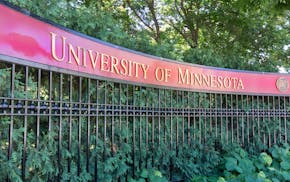Bertrand Weber sensed skepticism in the nutrition department of the Minneapolis schools when he took over in early 2012, preaching the gospel of feeding students fresh, minimally prepared and nutritious food.
But on a windy Friday in the high 80s Weber found himself joined by a dozen co-workers, from interns to his top managers, planting a demonstration garden on what used to be a weedy front yard of the district's Culinary Center on Plymouth Avenue. Donated seedlings ranging from Italian kale to Big Zebra tomatoes took their place in the freshly tilled and composted plot.
The 2,500-square-foot garden is intended to make visible the nutritional changes taking place under Weber. He's pushed the district from a factory model of prepackaged breakfasts and lunches toward fresh, local foods students actually like. But the workers who were planting alongside him Friday made it clear that they've been changed by their new mission as well.
Irfan Chaudhry, the department's No. 2, has been with the Minneapolis schools since 1998. But after listening to Weber, he's changed his approach to food, including installing a 10-by-10 home plot for vegetables.
In some ways, the department's new strategy — sourcing more food from local farmers, bakers and other suppliers — is a return to Chaudhry's roots as a youth in Pakistan, where food was purchased daily at the local market rather than weekly at an American supermarket. The American food system, with its plentiful supplies of fruits and vegetables transported from afar, was a revelation, he said — until he began to factor in the ecological costs of transportation and other practices. He began to think about the impact on future generations.
Now, he said, "We try to eat simple, locally grown food as much as possible."
Weber has made such sweeping changes that the School Nutrition Association gave him its national rising star award for 2014. But on Friday, the ponytailed boss with the high five-figure salary and green bandanna was out digging in the dirt.
First claim on the garden's produce, ranging from peppers to basil, will go to workers in a department where the nonsalaried staff earns an average of about $14 per hour. But Weber also hopes to work out a way to share with neighbors around the North Side site.
Minneapolis has wide disparities in consumption of fruits and vegetables, according to the city health department; residents of color and those with low incomes are more likely to suffer from obesity and diabetes. The department has been encouraging neighborhood gardening, with particular outreach on the North Side.
Buying local
Seedlings for Friday's planting bee were mostly donated by the small, local growers from whom the district is buying more of its vegetables. It aims to buy 10 percent of its produce from such buyers this year, often using root vegetables such as potatoes, beets and carrots or other long-keeping items such as squash. It will buy on contracts from eight growers in the next school year, and make spot purchases from another eight, most of them within 75 miles, according to Andrea Northup, the district's farm-to-school coordinator.
Statewide, the most recent federal farm-to-school census found 179 school districts — or about half — buying at least some local food in the 2011-2012 school year, compared to fewer than 20 in 2006. That was a $9.3 million boon to local farmers.
But it has also been a boon to staff and students, who are becoming more adventuresome eaters, according to Ricardo Abbott, who is both the department's operations manager and executive chef.
Take jalapeño peppers, the Chilean-born Abbott said. Before, "we couldn't give them away," he said. "Now we can't get enough."
On Thursday, the district's pilot mobile food truck visited Southwest High School, offering a turkey burrito bowl as an option, with a corn salsa featuring jalapeños.
"We could have made another 25 pounds of it," Abbott said. "It's a beautiful thing."
Steve Brandt • 612-673-4438
Twitter: @brandtstrib
'Human error' behind Robbinsdale shelter-in-place alert that was mistakenly sent countywide

Going to Wolves or Twins tonight? How to get there (and maybe avoid traffic).
Focusing on bringing football film into frame
